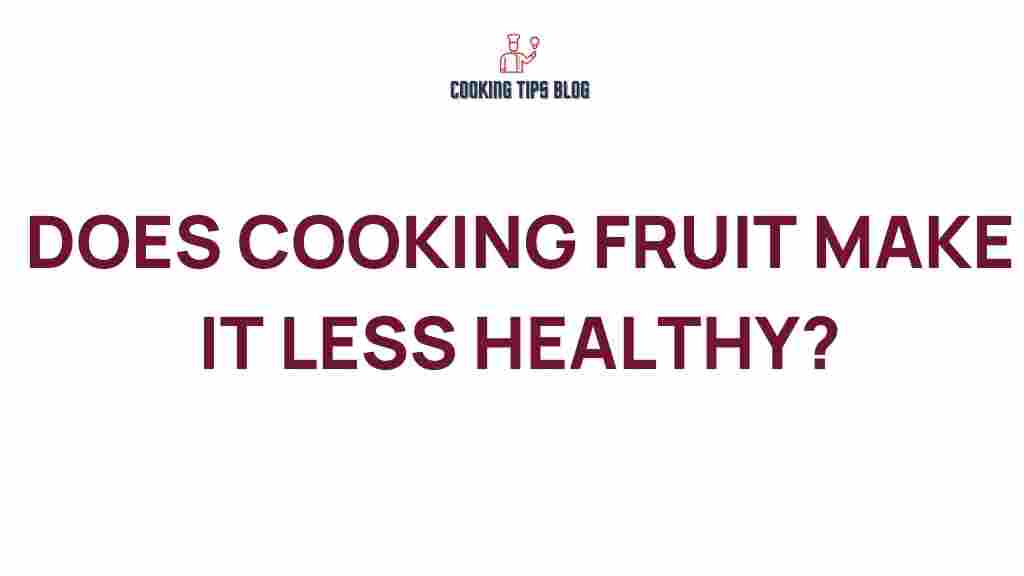Does Cooking Fruit Compromise Its Health Benefits? Let’s Explore Cooking Fruit!
Fruits are often hailed as nature’s candy, packed with essential vitamins, minerals, and antioxidants. However, a common question arises: does cooking fruit compromise its health benefits? This article will delve into the effects of cooking on fruits, addressing the nutritional changes that occur, and offering practical advice on how to enjoy fruits while maximizing their health benefits.
The Nutritional Power of Fruits
Fruits are rich sources of:
- Vitamins (such as Vitamin C and A)
- Minerals (like potassium and magnesium)
- Dietary fiber
- Antioxidants
- Natural sugars
These components are essential for maintaining good health, preventing chronic diseases, and boosting overall well-being. But what happens when we decide to cook fruits?
How Cooking Affects Fruit Nutrients
Cooking fruit can alter its nutrient profile in various ways. Here are some key points to consider:
- Vitamin Loss: Cooking can lead to the degradation of certain vitamins, particularly water-soluble vitamins like Vitamin C and some B vitamins. When fruits are heated, these vitamins can diminish significantly.
- Softening Fibers: Cooking can break down the fibers in fruit, making them easier to digest. However, this can also reduce their overall fiber content.
- Increased Antioxidants: Interestingly, cooking certain fruits can actually increase the availability of antioxidants. For example, cooking tomatoes increases the bioavailability of lycopene, a powerful antioxidant.
- Flavor and Sugar Concentration: Cooking can enhance the natural sweetness of fruits. By breaking down starches into sugars, cooked fruits often taste sweeter, which can be appealing in desserts and other dishes.
Types of Cooking Methods and Their Impact
Different cooking methods can yield various effects on fruit’s nutritional value. Here’s a breakdown of common methods:
- Boiling: This method can lead to significant nutrient loss, especially for water-soluble vitamins. It’s best to minimize boiling time and use minimal water.
- Steaming: This method is gentler than boiling and tends to preserve more nutrients. Steaming fruits for a short duration can offer a healthy compromise.
- Baking: Baking fruit can enhance its flavor while retaining some nutrients, although it may still lead to some loss of vitamins.
- Sautéing: Quick cooking in a small amount of fat can retain more nutrients compared to longer cooking methods.
- Microwaving: This method uses less water and shorter cooking times, making it a better option for preserving nutrients.
Maximizing Health Benefits While Cooking Fruit
Even though cooking fruit may lead to some nutrient loss, there are ways to prepare fruits while still enjoying their health benefits:
1. Choose Fruits Wisely
Some fruits retain their nutrients better when cooked. Opt for:
- Tomatoes
- Carrots
- Spinach
2. Use Minimal Water
When boiling or steaming, use just enough water to prevent sticking. This reduces nutrient loss.
3. Cook for Shorter Times
Minimize cooking times to preserve the most nutrients. A quick sauté or steam is often best.
4. Enjoy Raw and Cooked
Incorporate both raw and cooked fruits into your diet. Eating them raw maintains their vitamin content, while cooked fruits can provide different flavors and textures.
5. Pair with Healthy Fats
When cooking fruits, consider adding healthy fats like olive oil or coconut oil. This can enhance the absorption of fat-soluble vitamins.
6. Experiment with Recipes
Try different cooking methods and recipes to discover what works best for you. For example, baked apples with cinnamon can make a healthy dessert without compromising too much on nutrients.
7. Store Properly
Ensure that cooked fruit is stored properly to prevent spoilage and nutrient loss. Refrigerate cooked fruit in airtight containers.
Troubleshooting Common Concerns
Here are some common concerns when cooking fruit and how to address them:
Concern: The Fruit Becomes Too Mushy
Solution: Reduce cooking time and use lower heat settings. This helps to retain texture.
Concern: Nutrient Loss is Too High
Solution: Focus on methods like steaming or microwaving, which tend to preserve more nutrients than boiling.
Concern: Flavor is Lacking
Solution: Enhance flavors with spices, herbs, or a squeeze of lemon juice. This can make cooked fruits more appealing.
Concern: Not Sure Which Fruits to Cook
Solution: Research fruits that are best enjoyed cooked. Fruits like peaches, pears, and apples can be delicious when baked or stewed.
Conclusion: Cooking Fruit, A Balanced Approach
In conclusion, cooking fruit does alter its nutritional profile, but that doesn’t necessarily mean it compromises health benefits entirely. By understanding the effects of different cooking methods, selecting fruits wisely, and utilizing proper techniques, you can enjoy the best of both worlds – the delicious flavors of cooked fruit and the health benefits of raw fruit.
Remember, moderation is key. Incorporating a variety of both raw and cooked fruits into your diet will help you maximize your nutrient intake. So, don’t hesitate to explore the culinary possibilities of cooking fruit while keeping your health in mind!
For more tips on healthy eating, check out this guide on nutrition. If you want to learn more about fruits and their benefits, visit this resource.
This article is in the category Healthy and created by Cookingtipsblog Team
